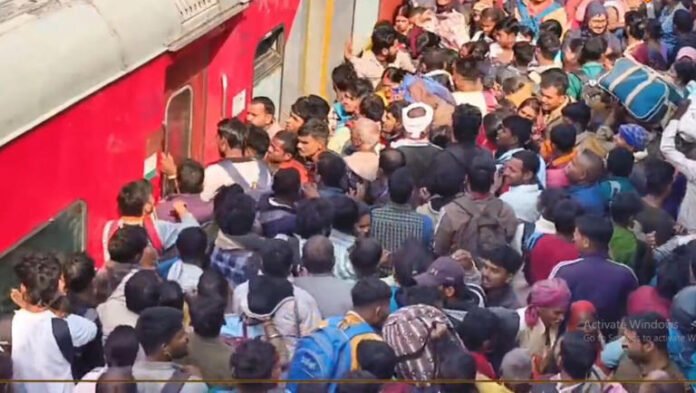The Maha Kumbh Mela, one of the largest religious gatherings in the world, attracts millions of pilgrims from across India. As devotees make their way to Prayagraj for the holy dip in the Ganges, the journey itself has turned into a nightmarish ordeal due to extreme overcrowding in trains. Packed compartments, suffocating conditions, and an overwhelming lack of basic amenities have made travel an endurance test for thousands.
A Cramped and Suffocating Journey
For many pilgrims, the excitement of participating in the sacred event is quickly overshadowed by the grim reality of train travel. Passengers squeeze into every available inch of space, with some forced to sit on luggage racks, cling to doorways, or even squat on the floor between rows of seats. The train compartments, designed to accommodate a specific number of travelers, are overflowing beyond capacity, making movement nearly impossible.
Many passengers describe the suffocating conditions, with little to no ventilation inside the packed coaches. Those unable to secure seats stand for hours, struggling to balance themselves as the train jerks forward. Some travelers, especially the elderly, are left with no choice but to lean against walls or sit on the floor, enduring exhaustion and discomfort.
Lack of Basic Facilities
With the sheer number of people crammed inside the trains, access to basic amenities has become a significant challenge. Many passengers complain that reaching the bathrooms is almost impossible, as aisles are blocked by fellow travelers. Those who do attempt to use the facilities often find them in an unsanitary state due to excessive usage and lack of maintenance.
Drinking water and food supplies are another major concern. Vendors struggle to move through the crowd, leaving passengers with limited options to purchase essentials. Those who board the train with packed meals often find themselves unable to even open their tiffins due to the lack of space. Many rely on fellow travelers for assistance, sharing whatever little food and water they have.
Risking Lives for Devotion
For some passengers, the desperate need to reach their destination forces them to take extreme risks. Many travelers are seen clinging to the edges of train doors, perching themselves dangerously close to the tracks. Some even ride on top of carriages, exposing themselves to fatal accidents. The situation becomes even more dangerous when the train slows down at stations, with people scrambling to either get on or off, sometimes leading to injuries and chaos on the platforms.
Families traveling together face an additional challenge—keeping track of one another. In the chaos, children and elderly passengers are at risk of being separated from their groups. Stories of family members being left behind at stations or struggling to rejoin their groups after being pushed aside in the rush are not uncommon.
Railway Authorities Under Pressure
The Indian Railways has been under immense pressure to accommodate the surge of passengers traveling for the Maha Kumbh Mela. Special trains and additional coaches have been introduced, but they have proved insufficient in managing the massive crowd. Many passengers struggle to secure tickets, with general compartments often carrying double or even triple their intended capacity.
Authorities have deployed railway police and additional personnel to manage the situation at key stations. However, controlling the influx of passengers remains a challenge. Complaints of mismanagement, lack of clear announcements, and delays have added to the frustration of travelers.
A Test of Faith and Endurance
Despite the overwhelming hardships, many pilgrims remain undeterred. For them, reaching the Maha Kumbh Mela and taking a dip in the holy waters of the Ganges is a matter of deep faith. The journey, no matter how difficult, is seen as a test of devotion. Some even believe that enduring these struggles earns them greater spiritual merit.
As the event continues, authorities are expected to take further measures to ease travel conditions. However, the sheer scale of the pilgrimage and the unrelenting flow of devotees make managing the situation a monumental challenge. Until then, passengers aboard these crammed trains can only hold onto their faith—and whatever little space they can find.

